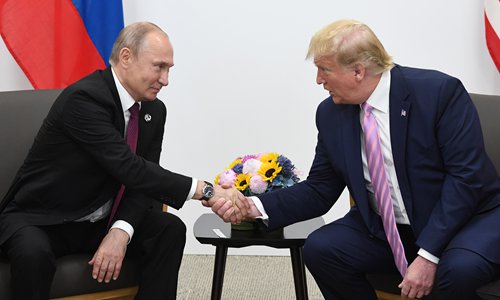HOME >> OPINION
Divergence in fundamental interests determines US-Russia ties
By Sun Zhuangzhi Source:Global Times Published: 2019/7/3 19:13:40

Photo: VCG
The meeting between Russian President Vladimir Putin and his US counterpart Donald Trump at the G20 summit in Japan spanned subjects from trade to disarmament. Putin said the following day that Russia would do all it could to promote relations with the US and it was up to Washington to decide how best to forge ties with Moscow.
With aggressive US moves like the imposition of sanctions against Russia, bilateral relations have moved over a bumpy road. Russia insists hopes to improve ties with the US but wouldn't give in. Attempts to improve relations between the former Cold War foes have not made progress because Russia probably feels the US is not determined enough to mend fences.
When Trump took office, Russia may have expected better bilateral ties due to Trump's personal admiration for Putin. However, because of domestic constraints, it was tough for Trump to realize his promise in the 2016 election campaign - to boost Washington's ties with Moscow. Furthermore, influenced by Russiagate, Trump could not do exactly what he wanted, especially regarding ties with Russia.
Among all barriers to better Washington-Moscow ties, the most significant are structural contradictions, which refer to the divergence in fundamental interests on issues such as Ukraine. The US coming down on Russia is mainly due to differences in strategic interests, which are hard to get rid of in the short run.
Russia-US relations may be at a crossroads. Both countries have realized the need to boost bilateral ties. But some political forces and opinion in the US are ratcheting up pressure on Russia to extract further concessions from Moscow, especially on the Ukraine issue. Trump is facing domestic pressure over his Russia policy. While writing about Trump's moves at the G20 summit, Politico, a US publication, said "Trump's bonhomie toward Putin has continued into the G20 summit. As he left for the event, Trump blasted host country Japan and India on trade but said nothing about Russia."
Barriers exist between Washington and Moscow. If they cannot be properly addressed, US-Russia relations will fail to improve. Since the end of the Cold War, ties between the two countries haven't been smooth. If the Putin administration plans to make Russia stronger, it has to break out of Western shackles, where the clash of their fundamental interests lies. Both Russia and the US have their own demands to boost bilateral ties, and neither of them is willing to make concessions in key domains such as Crimea and Syria. Therefore, it is tough to break the deadlock in ties.
During their G20 meeting, Putin invited Trump to attend the May 9 Victory Day commemorative events in Moscow in 2020. It is still hard to predict whether Trump would visit Moscow next year as the international situation is fluid and anything is possible; and Trump usually behaves mercurially. The 2020 presidential election campaign and how Trump plays against the establishment will also decide whether he will visit Russia.
If domestic opposition against Trump is still strong and the public continues to criticize Russiagate, Trump may act scrupulous in not trying to improve ties with Russia in order to please voters. If needed, the White House may even further try to rein in Moscow. Hence, bilateral relations will be constrained by US domestic opinion.
However, what mainly determines ties are fundamental interests of the two major powers. No matter who the US leader is, American interests will be paramount. So will be Russia's interests.
The author is head at the Institute of Russian, Eastern European &Central Asian Studies of the Chinese Academy of Social Sciences. opinion@globaltimes.com.cn
RELATED ARTICLES:
Posted in: VIEWPOINT